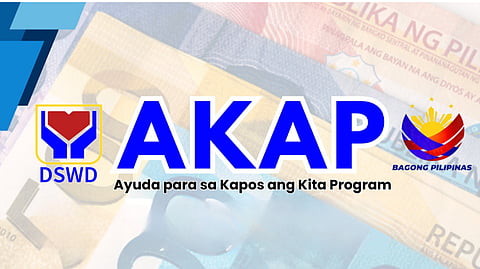
- NEWS
- the EDIT
- COMMENTARY
- BUSINESS
- LIFE
- SHOW
- ACTION
- GLOBAL GOALS
- SNAPS
- DYARYO TIRADA
- MORE

A House leader on Friday allayed fears that the contentious Ayuda para sa Kapos ang Kita Program (AKAP) under the Department of Social Welfare and Development (DSWD) would be prone to corruption, unlike the infamous pork barrel scam and confidential funds, which critics have deemed the new face of such misuse.
In an interview, Ako Bicol Rep. Elizaldy Co, the chairperson of the House Committee on Appropriations, insisted that the AKAP is also a far cry from the “Davao model,” alluding to the city’s confidential spending, which skyrocketed over the years under the tenure of the Duterte family.
“The AKAP is really distant [to confidential funds]. The AKAP is zero corruption [but] the confidential fund or Davao model, that is one hundred percent corruption. I will make sure that there is corruption there, especially if those who operate it have a habit of doing it,” Co said in Filipino.
Davao City’s confidential fund was pegged at about P144 million in 2016, the first half of which was under the mayorship of Rodrigo Duterte, who became president that same year. He was then succeeded by his daughter, Vice President Sara Duterte, who held the post until 30 June 2022 after she won the second-highest position in the country.
During the VP’s term as mayor, Davao City’s confidential spending more than doubled to P293 million in 2017 and further soared to P420 million in 2018, and P460 million each year from 2019 to 2022, based on audit findings.
“AKAP, [and other social] aids [like] 4Ps are better as they go directly to people, no friction cost, no corruption,” Co contended. “You have seen how successful the 4Ps, it's been 20 years. Just like AKAP, there is no [corruption there]. But that confidential fund, it even outweighs the Napoles [pork barrel scam].”
AKAP provides one-time cash assistance ranging from P3,000 to P5,000 to “near-poor” minimum wage earners or those with incomes that fall below the poverty threshold and are not covered by other government aid programs.
The project, which was the brainchild of Speaker Martin Romualdez and Co, was allocated a whopping P26.7 billion in the 2024 budget and another P26 billion this year.
Former lawmakers and other key government officials, along with progressive groups, have expressed scathing criticism over the AKAP, which received significant funding at the expense of the education and health sectors.
The Department of Education incurred a P12-billion budget cut in the 2025 budget, while the Philippine Health Insurance Corporation received no government subsidy, which critics claim is unconstitutional.
Co, however, lambasted the opposition, arguing that they were merely criticizing a crucial program that they should have carried out when they were still in office.
“Of course, the opposition is afraid because the administration has done something they have not done. Where did they take what should have been given to the people? And that's when our countrymen will realize that the administration is sensitive [for their needs],” he averred.
House members were headstrong about the inclusion of the AKAP in this year’s budget amid calls to abolish it over concerns that it might be politicized in the May 2025 polls, citing the presence of congressmen during the dole-out.
Groups asserted that Congress must pass a law increasing the minimum wage rather than formulating a stop-gap measure.
But Co stressed that the members of the House had consistently pushed for it to the extent that they were willing to implement a reenacted budget.
Legislators, particularly members of the House, insisted that the DSWD solely handles the allocation and that they play no role in disbursing the funds. Moreover, they claimed that their role would be limited to overseeing and suggesting that the DSWD implement the social program in areas where it is needed.
President Ferdinand Marcos Jr. delayed the signing of the 2025 budget following public clamor for a thorough review over questionable cuts and the inclusion of programs such as the AKAP.
This year's expenditure dropped to P6.326 trillion from P6.352 trillion after Marcos vetoed line items inconsistent with his administration’s priority programs. AKAP, however, passed Marcos' scrutiny and was retained in the 2025 budget.
